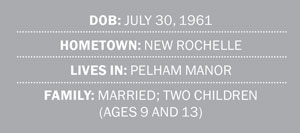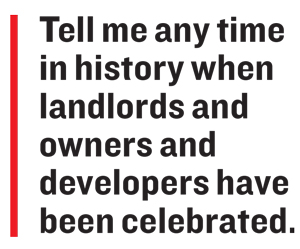John Banks is the president of the Real Estate Board of New York, the powerful trade group with more than 17,000 members that lobbies on behalf of the city’s $1 trillion-plus real estate industry. Banks, the first African-American leader in the organization’s 121-year history, took over in 2015 after Steven Spinola’s 30 years on the job. Last year, Banks hammered through mission-critical issues, including a replacement for the 421a tax  break, the rezoning of Midtown East and REBNY’s long-awaited residential listings service — a syndicated feed that consolidates listings in NYC from many of the leading online platforms. Prior to REBNY, he spent 13 years as the top lobbyist at Consolidated Edison. A Manhattan College graduate, Banks got his start in government as an investigator in Mayor Ed Koch’s Office of Operations and later worked on Mayor Bill de Blasio’s transition team.
break, the rezoning of Midtown East and REBNY’s long-awaited residential listings service — a syndicated feed that consolidates listings in NYC from many of the leading online platforms. Prior to REBNY, he spent 13 years as the top lobbyist at Consolidated Edison. A Manhattan College graduate, Banks got his start in government as an investigator in Mayor Ed Koch’s Office of Operations and later worked on Mayor Bill de Blasio’s transition team.
You’re from New Rochelle. What was your childhood like? We lived a very suburban, Rob and Laura Petrie middle-class [life]. My mother was a nurse and my father was a bartender, so we weren’t rich and we weren’t poor by anyone’s measure. But I remember things that I tell my son. I say, “Dude, when I got new sneakers, I had to sit in the aisle of the supermarket. There were two bins and you had two choices — you could have high or low, black or white.” I did that until I got sick of being embarrassed and then went out and started raking leaves and shoveling snow to get my own money so I could buy a pair of PF Flyers.
Did I read something about you being involved in musicals? We were an all-boys school, so my buddies and I were in the stage crew, which was the rowdy portion of the drama club. Since we were all boys, they would import girls to the high school for plays and, for us, it was an opportunity to hang out with girls.
So there was “Grease,” and what was the other one? “Godspell.” We got into trouble at the time because “Godspell” was on Broadway and we were within a 50-mile radius, so we had to pay a royalty. The school was not happy about that mistake.
You worked for Mayor Koch, one of the more colorful characters in New York, and were thrust into the aftermath of the parking violations scandal right away. Did you find some dirt? All of what we found was not dirt — it was really just management issues. There was no other PVB smoking gun. But that’s how I started, and that gave me the opportunity to learn about city government, because you’re digging in the bowels of an audit.
Do you think city government is more transparent today than it was back then? Yes and no. It’s more transparent because there are more procedures in place to force transparency. I say no because the transparency is false. People aren’t looking at the things they should look at or that I would ask them to look at in order to really dig underneath.
In the last couple years, there’s been a fair amount of upheaval in Albany. Do you think the “three men in a room” culture there has changed? You need leadership to make decisions. You can’t make decision through the democratic process — you get a stalemate, right? There are too many voices. At some point, you need a strong leader in the legislative body to corral those voices and make a decision and say, “We’re done.” And so from that perspective, the “three men in a room” never bothered me.
 You were at Con Ed for 13 years. What was the biggest challenge there? The biggest challenge was getting the infrastructure of Con Edison, which is run by engineers who have a different perspective on the world, to understand that what happens in the city is political. It’s not as linear as engineering. I used to say that as an engineer, two plus two is always four. In the political world, two plus two is “What do you need it to be today?” Like the real estate industry, Con Ed is ubiquitous in New York and they can’t take their assets anywhere, so they needed to be sensitive to that.
You were at Con Ed for 13 years. What was the biggest challenge there? The biggest challenge was getting the infrastructure of Con Edison, which is run by engineers who have a different perspective on the world, to understand that what happens in the city is political. It’s not as linear as engineering. I used to say that as an engineer, two plus two is always four. In the political world, two plus two is “What do you need it to be today?” Like the real estate industry, Con Ed is ubiquitous in New York and they can’t take their assets anywhere, so they needed to be sensitive to that.
The decisions REBNY makes affect hundreds of thousands of New Yorkers when it comes to housing. Are you cognizant of that every day? It doesn’t affect me. My job is to be an advocate, and I’m a fierce advocate. So if you give me a mission, I will do my best to achieve that mission.
How do you reconcile it when your personal views don’t necessarily match what you’re paid to do? I don’t get paid for my personal views.
But there are times when you say something when you believe a step is wrong. When President Trump talked about Charlottesville, I felt no hesitation whatsoever to say that I thought he was wrong and that our industry didn’t agree with what he said.
Did you check in with people before you told us that? No.
Have you seen instances where Trump handled himself better? Far be it for me to pretend I know what it’s like to run the country. I won’t try to comment on that. I am concerned, like everybody, that there are things going on in Washington that are weakening our country and I’m hopeful the president is able to right this ship and figure out some of these things. It’s similar to what Lew Rudin used to say about New York. He said, “If New York City does well, then real estate does well.” If the president does well, our country does well.
But the president doing well based on his agenda isn’t necessarily in line with what New York has said are its goals. I think they’re completely wrong in the way they’re approaching tax reduction and reform, because it is going to have a negative impact on New York. But overall the concern is, even though it might not be beneficial for New York real estate, if our country is stronger, we’ll figure it out. We’re New Yorkers, we fight to the death.
We’ve seen the tenant advocacy movement grow in New York. Developers, specifically, have been painted in a certain light. Do you think the industry is misunderstood? Absolutely, but this is not a new phenomenon. Tell me any time in history when landlords and owners and developers have been celebrated. Is it growing in opposition? The answer is yes — I think that is in part a function of people’s lives in the city. The disparity between the haves and the have-nots is just getting wider.
What’s something you recently splurged on and were like, “Damn, that was fun”? I purchased a [28-foot] boat this past year. It’s called Duncan, after my brother’s middle name, which means “brown warrior” in Scottish. My brother died of kidney disease a few years ago. When he was first diagnosed, we bought a boat together and would go out.
What are your biggest weaknesses on a personal level? I eat too much. It’s simple. I don’t look at my life that way. I’m like Popeye: I yam what I yam and that’s all that I yam.
Complete this sentence for me. Your tombstone: “Here lies John Banks.” Take it anywhere you want. If I want? I’m not fuckin’ dead yet.
“Here lies John Banks, and he was a good person.”
